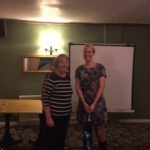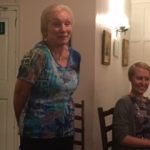On Monday 4th September we welcomed Joanna Lamb, who spoke to us about her experiences as a volunteer in Papua New Guinea, having lived in Australia for over 7 years. As she has a masters degree in water and sanitation and plays a lot of sport, Joanna found herself working with WaterAid on a project combining sanitation and sport.
First, we were given an insight into Papua New Guinea, about which several members admitted knowing little. It gained independence from Australia in 1975 but has remained part of the Commonwealth and consists of a series of islands. There are several Australian ex-pats there but very few British people. Due to the distance between islands and even villages, there are over 800 different indigenous peoples and therefore languages. There is little formal employment among villagers but families all work on the land. They don’t recognise themselves as poor, so resent outside agencies coming in, telling them how to change things.
This can make life difficult for volunteers to bring projects to the country but there are other difficulties to contend with as well. Travel is difficult, as there are few roads outside the capital, and volunteers have to live in locked compounds, as it is not a safe area to walk around, especially as a woman. While life expectancy is as low as 67, the broadly Christian attitude mixed with a belief in sorcery means that much illness is explained by “God’s will”. This makes it even more difficult to explain how poor sanitation can cause illness and mortality.
Joanna joined a WaterAid office of 10 staff, of whom 8 were native to Papua New Guinea and worked on a WASH (Water and Sanitation & Hygiene) project. 60% of people in Papua New Guinea do not have access to clean water, 81% have no access to toilets and around 100 children die from diarrhoea every year. Schools do not have toilets, one of the reasons that menstruation is a huge problem for girls, leading to them staying at home.
Joanna’s project aimed to use sport to help educate and improve hygiene in women and girls, as sport is incredibly important in the communities there. The project worked with the captain of the national netball team with the intention of spreading understanding and good practice. There were usually no toilets at sports venues, which again caused problems for girls menstruating, causing them to stay at home. Working through sport in schools, teaching about hand-washing and hygiene could be combined with teaching and playing netball. In addition, leadership qualities could be encouraged, especially in girls.
Joanna acknowledged how difficult some of the work had been and hoped it would continue to have an effect, although she had been surprised at first at how slow it is to change attitudes. She also felt that, with no sanitation engineers in the country, advancement would continue to be difficult if all the engineers have to come from abroad.



